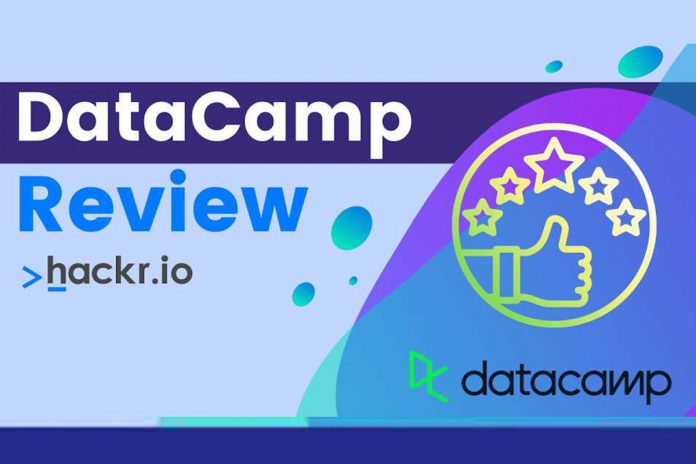Build your data skills online with DataCamp. Data Camps is a complete R, Python, and data science repository. If you want to become a data scientist or just brush up on your data science skills, Datacoms is a superb resource.
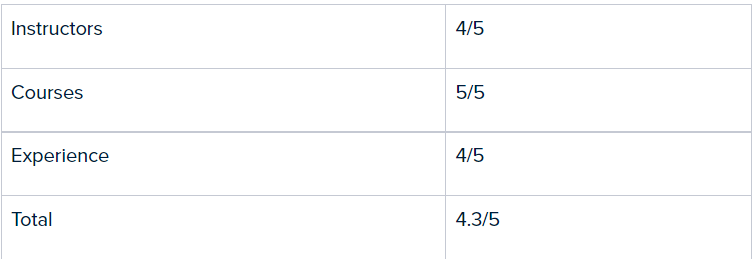
At-a-glance:
- Data Camps provides an all-around great learning experience for those new to the field of data science.
- DataCamp is primarily intended for those without programming knowledge or computer science experience, but there are more advanced courses.
- While basic access is free, students need a subscription to finish most courses, try skill paths and career tracks, or get a certification.
Ultimately, DataCamp is a superb resource for those who want to learn more about data science and data engineering, but those who take these classes will need to be driven and self-motivated.
In our comprehensive DataCamp review, we’ll cover DataCamp’s most popular courses, its pricing, and whether it’s worth it to someone who wants to become a data scientist.
What Does DataCamp Offer?
DataCamp offers 354 courses, 51 skill tracks, and 12 career tracks — all in the field of data science. Through Data Camps, computer scientists can learn Python, R, SQL, and more, all while building their data science portfolio through real-world projects.
In DataCamp, students can learn in four ways:
- Courses: Individual data science courses such as Introduction to Python, Introduction to SQL, and Introduction to R introduce students to a single concept at a time.
- Skill Tracks: Learning skill tracks such as R Programming, Importing & Cleaning Data, and Visualization include multiple, in-depth classes to provide students with a broader spectrum of knowledge.
- Career Tracks: Career tracks such as Data Analyst, Data Scientist, and Python Programmer include comprehensive sets of courses intended to give students everything they need to know about a specific career.
- Certifications: Certifications such as Data Scientist or Data Analyst prove an individual’s existing knowledge about specific fields.
Career and skill tracks are both built out of courses — but you can also take these courses individually. Either way, students can learn from these courses, skill tracks, and career tracks as long as they pay for DataCamp’s monthly subscription cost.
What Can You Learn at DataCamp?
DataCamp provides courses in data science, data engineering, data analysis, and tools to support these fields. At DataCamp, you can learn about Python, SQL, R, machine learning, natural language processing, and more.
Data Camps is firmly designed for the data science and data engineering fields. So, even in the “Introduction to Python” classes, Python is mostly taught for data science, even though it is a general-purpose programming language. Because of this, you should be certain that you’re interested in the field of data science first.
Because of DataCamp’s hands-on learning methods, students will start learning how to program, analyze data, and engineer databases immediately. Students can develop their portfolios and prepare for coding interviews.
But do note that most of the classes require that you teach yourself. If you’re looking for a lot of instruction, this isn’t the platform for you.
Is DataCamp Accredited?
DataCamp is not accredited.
While Data Camps does provide certifications as credentials, they’re only as valuable as an employer believes them to be. You’ll need to trust in your own skills and build a portfolio.
How Does DataCamp Work?
DataCamp provides a series of real-world lessons and use cases intended to teach you about a given skill, strategy, or technology.
When you join a lesson, you’ll see a screen that gives you an exercise and a compiler. It’s up to you to solve the exercise, although the system will also guide you.
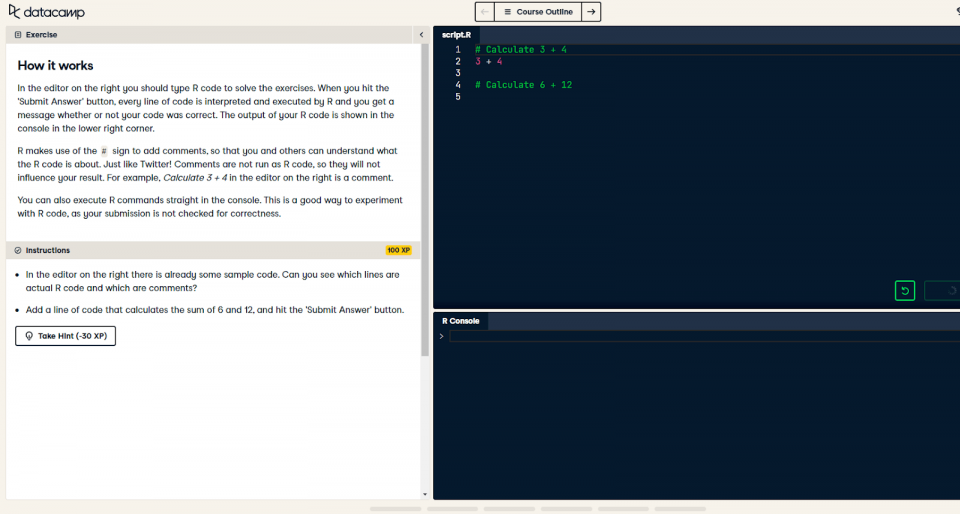
By teaching students in this interactive, real-world environment, DataCamp fosters critical skills that would be needed for a data science career.
How to Open a DataCamp Account
Because many of DataCamp’s introductory courses are free, you don’t need anything — even payment information — to open a DataCamp account.
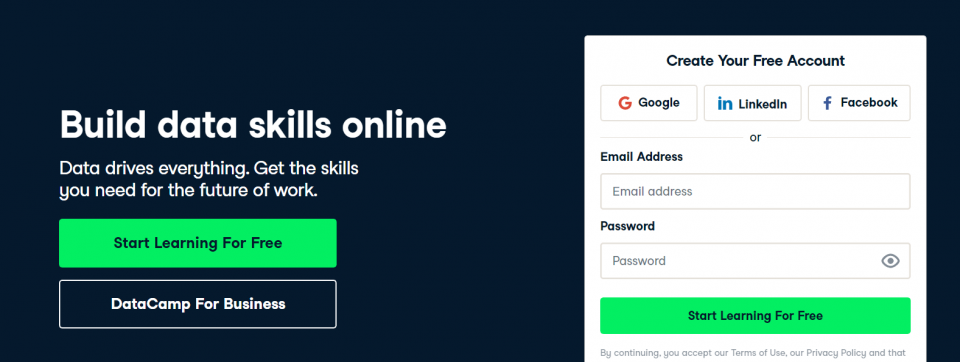
You can use your Google, LinkedIn, or Facebook account to sign up for free or create an account with your email address. If you try to access premium material, you will be prompted to start a subscription.
Is DataCamp Free? DataCamp’s Tiers of Service
DataCamp does provide six free courses, but everything else requires payment.
DataCamp actually has multiple tiers of service.
As of 2022:
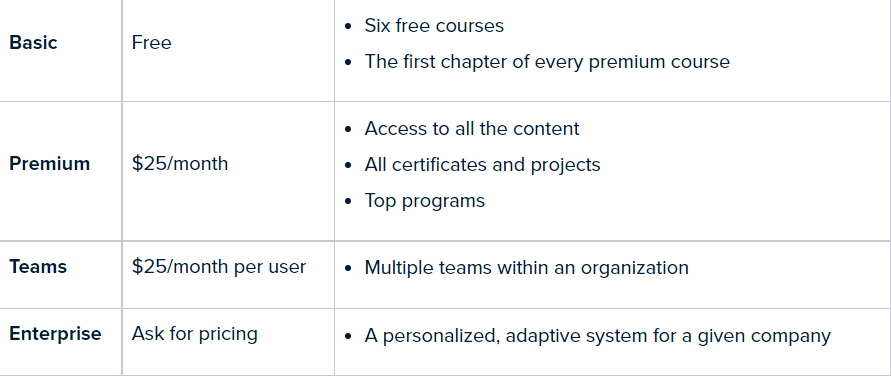
You can learn quite a lot on DataCamp for free, but eventually you’ll need to pay. For instance, while you can go through a course through the basic tier, you’ll have to pay to receive the certification.
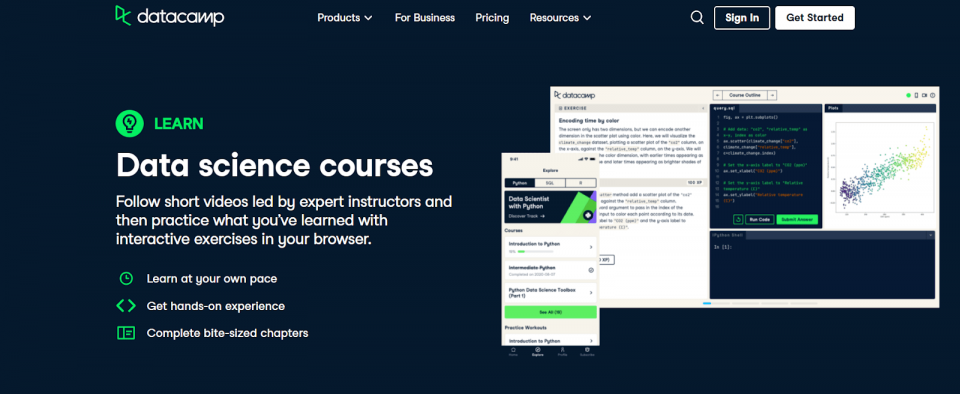
DataCamp Free Classes: The Most Popular Free Courses
DataCamp offers six courses for free, notably a comprehensive one on Python. If you’re wondering whether DataCamp provides the right learning tools for you or want a DataCamp Python review, check out these six courses:
2 hours · 15 videos · 48 exercises
An excellent introduction to data science. Find out more about what the field of data science entails, what a data scientist does, and what the applications are for data science across multiple industries.
2 hours · 12 videos · 36 exercises
What is machine learning? Machine learning is a type of artificial intelligence that can learn and adapt. Find out how machine learning is applied to various use cases — and the major technologies involved.
2 hours · 11 videos · 32 exercises
What exactly is data engineering? Data engineers build the systems that data scientists and data analysts use. Data Engineering for Everyone digs into how data engineering is used and the data engineering career outlook.
4 hours · 11 videos · 57 exercises
Learn one of the most popular programming languages today. Introduction to Python walks students through the Python language — a language frequently used in data science, general-purpose programming, and natural language processing.
4 hours · 1 videos · 41 exercises
SQL remains the most prolific database language in existence. Learn about SQL, SQL solutions such as Microsoft SQL, and how to create, query, and modify a database. SQL is one of the first places to start for those interested in database management.
4 hours · 0 videos · 62 exercises
R is a language specific to data science. An older language, it’s not “general purpose” in the way that Python is; instead, it’s primarily used for data and statistical analysis. Learn how to use R through popular, real-world use cases.
You can also start premium courses — DataCamp provides the first chapter of every course for free.
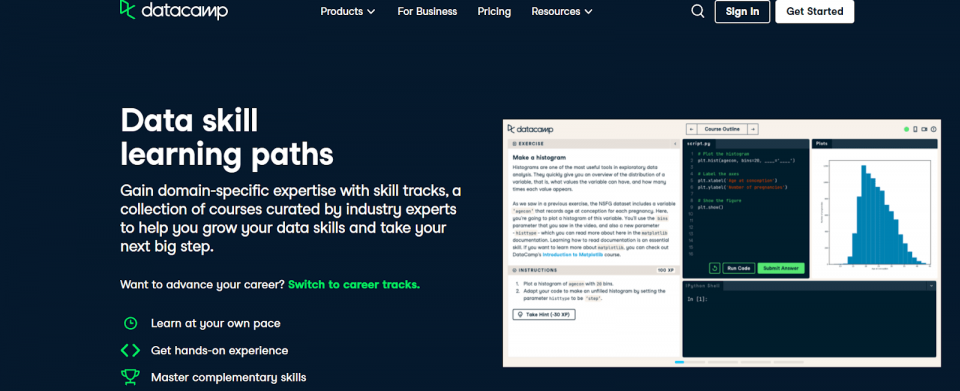
DataCamp Skill Tracks: The Most Popular Skill Tracks
The most popular skill tracks on DataCamp are likely Python Fundamentals, SQL Fundamentals, and Data Skills for Business.
Python Fundamentals
Python Fundamentals digs deeper than the Introduction to Python courses, introducing you to more advanced Python features and use cases. After the Python Fundamentals course, you should have a portfolio of Python projects.
SQL Fundamentals
Like the Python Fundamentals course, SQL Fundamentals will build upon the basic Introduction to SQL and teach you more about using SQL in the real world. Learn how to build databases that last.
Data Skills for Business
Find out how to incorporate data science into your business analysis. Many of those adjacent to the computer science fields still need to understand how business data works. Data skills for business is the perfect skill track.
Skill tracks dig deeper than courses by embodying all the courses you need to become a subject expert.
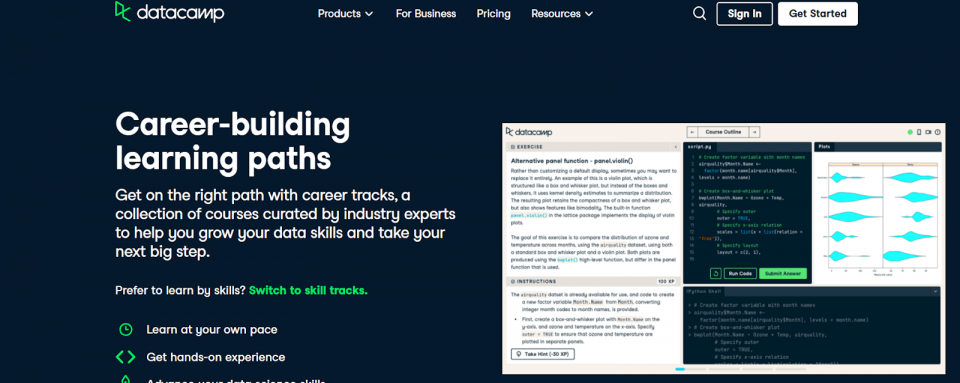
DataCamp Careers: The Most Popular Career Tracks
The Data Scientist and Data Analyst career tracks on Data Camps are likely their most popular career tracks, as they segue directly into certification. You can complete the Data Scientist and Data Analyst career tracks and then take a certification to prove your skills.
Data Scientist
The Data Scientist path is an 88-hour track that includes 22 courses. Students will learn the R language, data collection, data manipulation, data importing, data analysis, cluster analysis, and more. At the end, they will have the knowledge an entry-level data scientist candidate should have.
Data Analyst
Collect and analyze data to your heart’s content. The Data Analyst path is a 32-hour career path with 8 courses. Students will learn how to perform data analysis, how to visualize data, and how to build their careers with R.
Python Programmer
A 59-hour, 15-course career path, Python programmer takes you from beginner to advanced in Python data science. This Python Programmer track is specifically aimed toward data manipulation and unit testing and requires no prior coding knowledge.
Other career paths include Machine Learning Scientist, Quantitative Analyst, and Data Engineer. These career paths assume that you haven’t worked within the field before; they take you from A to Z.
DataCamp Certificates: Does DataCamp Offer Certificates?
The DataCamp certificate value varies depending on the employer; it depends on whether they’ve heard of DataCamp and respect their credentials. But acquiring additional certification certainly never hurts.
DataCamp provides two major certifications: Data Scientist and Data Analyst. DataCamp only started to offer certificates fairly recently.
But the fact that DataCamp actually has an entire enterprise and “for business” section bodes well for DataCamp certificates. By positioning itself as an enterprise resource, DataCamp has essentially promised companies that its training and courses are sufficient for real-world knowledge — and it needs to keep that promise.
How to Find the Best Courses on DataCamp
DataCamp isn’t like Coursera or Udemy; the courses are designed and presented internally. So, one major advantage of DataCamp is the courses have a very consistent quality.
DataCamp reviews highlight how easy and hands-on the material is, regardless of students’ prior Python or R knowledge.
To find the best courses for you, decide whether you need a class, skill track, or career path. From there, you will only have one choice for a given discipline, e.g., there aren’t multiple classes in “Introduction to Python,” — there is only a single lesson plan.
DataCamp Review: Pros, Cons, and User Reviews

By most reviews, DataCamp is one of the most popular methods of learning data science and data engineering. Data science is such a swiftly growing and changing field, however, that it’s still unclear how most employers will receive a DataCamp certification or career path.
On TrustPilot, DataCamp scores a 4.2/5, which is much higher than many similar programs. Due to its tight focus, rigorous controls, and quality assurance, DataCamp generally provides a great overall learning experience.
Ultimately:
- DataCamp is a great way to actually learn data science and data engineering.
- However, not all employers may acknowledge DataCamp’s value or credentials.
Alternatives to DataCamp
DataCamp is most similar to Codecademy and other code-teaching platforms. As you learn, you compile code — you learn by doing. But you can also see DataCamp (especially its skill tracks and career paths) as a bootcamp.

Codecademy
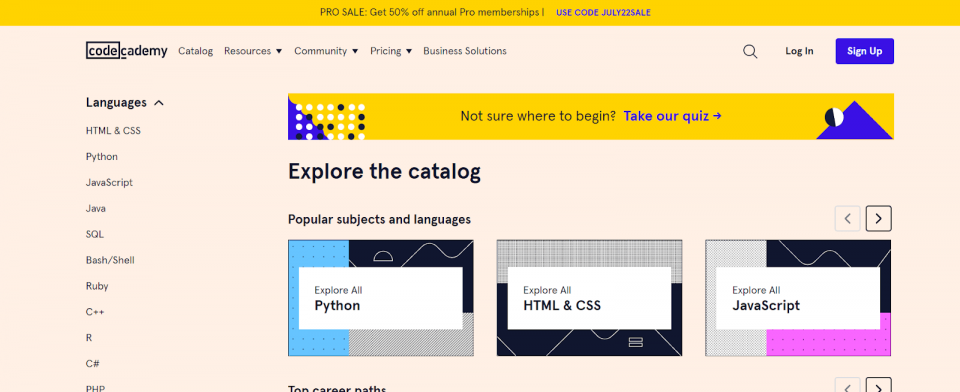
Codecademy supports a wider breadth of courses than DataCamp — otherwise, it’s similar. If you want more free courses, you can check out many of Codecademy’s introductory courses and compare them to DataCamp’s courses. DataCamp’s quality control is a little more rigorous, but its library is also more strictly defined.
FreeCodeCamp
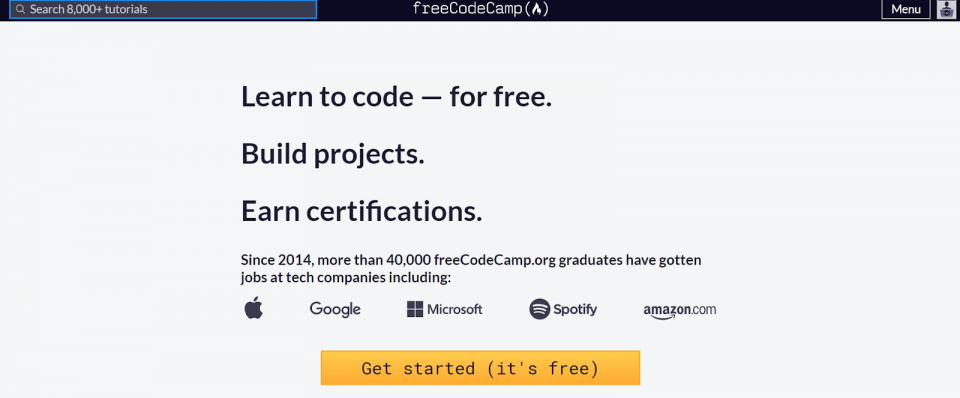
FreeCodeCamp is really more of a tutorial repository, although it does have a variety of skills tracks and interactive courses. FreeCodeCamp is best used to augment your learning at Codecademy or Data Camps, as you can run through exercises to heighten your understanding and mastery of computational sciences.
Udacity
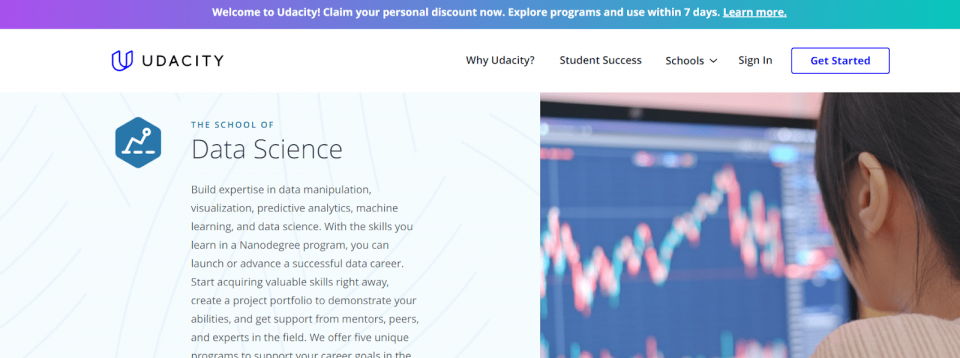
If you’re looking for a data science bootcamp, you can find one on Udacity. It has more rigorous lesson plans, although they also cost more. For instance, Udacity has the School of Data Science, along with numerous other “nanodegree programs.” These programs (essentially bootcamps) are usually over $1,000 but impart a lot of real-world, working knowledge.
Conclusion: Is DataCamp Good?
DataCamp is an incredible resource to break into the field of data science.
Whether you want to learn Python, SQL, or R, or you just want to dig more into machine learning, you can get started on the DataCamp platform for free.
Even better, the platform’s skill and career paths offer the flexibility to continuously learn, while new certificates offer the chance to prove your skills.
But the main takeaway from our DataCamp review is that the platform is self-paced and self-driven. It’s not the right platform for someone that needs a lot of guidance.
Looking for learning opportunities with more instruction?
Frequently Asked Questions
- Is DataCamp Really Good?
DataCamp provides everything you need to know about breaking into the field of data science. While it may not impart the same credentials as a degree program (or even a bootcamp), it does show that you’ve learned the fundamentals of data science.
2. Are DataCamp Courses Worth It?
If you’re trying to upskill, learn a language, or just learn more about data science and data engineering, Data Camps courses are more than worth it. But if you’re primarily trying to build a career or look for a job, you should be aware that they don’t have formal credentials.
3. Is a DataCamp Certificate Recognized?
Depending on the employer, a DataCamp certificate may or may not be recognized. Some employers believe a DataCamp certificate shows that you at least have entry-level knowledge in data science, while others may be skeptical. Build a portfolio to prove your skills.
4. Can DataCamp Get You a Job?
Data Camps can get you the knowledge you need to survive in the data science field. But it can’t get you a job based on its credentials alone. You will have to pass coding interview tests and build a coding portfolio.
5. Is DataCamp Good for Data Engineering?
DataCamp is great for data engineering, data analysis, data science, and anything adjacent — like machine learning. It is the leading platform for learning about data science.



